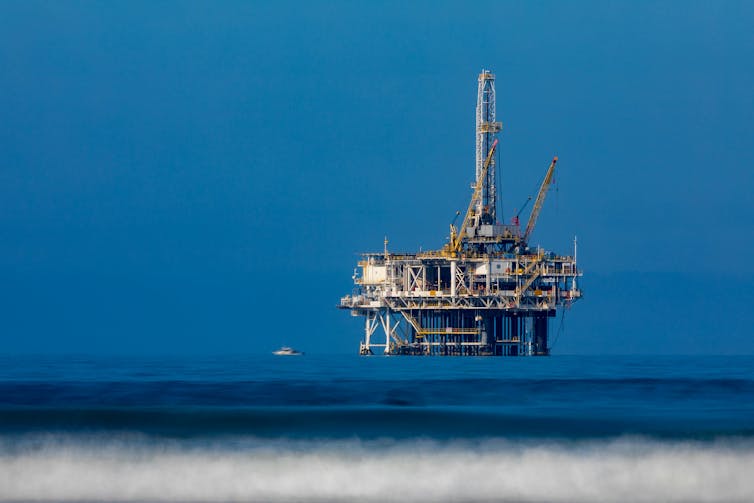In recent years, more and more lobbyists from the oil, gas and coal industries have taken part in international climate negotiations. Estimates of lobbyist numbers have risen sharply, from 503 at the 2021 Glasgow talks to 1,773 at last year's talks in Azerbaijan's capital Baku.
Author
- Christian Downie
Professor of Political Science, School of Regulation and Global Governance, Australian National University
Ahead of this year's climate talks, host nation Brazil moved to tackle climate disinformation and delay tactics with a simple but clear approach: asking participants to publicly disclose who funded them to attend.
Even so, around 1,600 fossil fuel lobbyists arrived at the COP30 climate talks in Belém, Brazil. If taken as a bloc, they would outnumber every national delegation other than the host nation.
This shows the size of the challenge Brazil took on as the first COP host in 30 years to push back against the tide of fossil fuel lobbying and climate misinformation. If this isn't tackled head on, climate negotiations will keep avoiding the core issue: phasing out oil, gas and coal, the commodities doing most damage.
Lobbying and disinformation in the spotlight
The reason lobbyists are sent is to protect existing revenue streams. Fossil fuel companies invest in lobbying because it works - and not just on climate. In August, the UN talks on plastic pollution collapsed for the second time. Hundreds of fossil fuel and chemical industry lobbyists had registered to attend . Many lobbied to expand recycling rather than reducing the production of new plastics.
This year, Brazil launched the Global Initiative for Information Integrity on Climate Change. The aim is to foster:
concrete solutions to address disinformation and related tactics seeking to delay and derail climate action.
It's the first time lobbying and disinformation have been targeted in this way. The UN has launched new guidelines asking participants to disclose funding for their attendance - and to sign a pledge confirming their objectives align with the Paris Agreement goals of holding climate change to 1.5°C.
The guidelines are optional and don't include lobbyists participating as part of a national delegation. But it's an encouraging sign the UN recognises the need to improve transparency and accountability.
On the first day of the talks, UN experts drew on the influential recent findings by the International Court of Justice that states and companies could be held legally liable for damage caused by extraction of fossil fuels. They called for a ban on fossil lobbyists and more transparency.
How fossil fuel lobbying corrupts climate negotiations
Brazil's efforts to draw attention to the problem comes after decades of obstructionist tactics.
In 1988, big companies created the Global Climate Coalition to represent the oil, gas, coal, utility and agriculture industries. The group had a clear goal: block or delay efforts by the United States government to limit the use of fossil fuels. It worked.
Researchers have shown these lobbying efforts were instrumental in then US President George W. Bush's 2001 decision to pull out of the Kyoto Protocol. The move influenced Australian Prime Minister John Howard's decision not to ratify Kyoto a year later. The decision set back the negotiations for years, as US support for climate negotiations became increasingly uncertain.
The names of these obstructionist coalitions have changed over the years. But as my colleagues and I describe in our recent book , many of the original companies paying to block climate action are still supporting similar groups.
At international forums such as the UN climate talks, lobbyists funded by these companies can play a double game . They can point to a lack of international action as a reason for not acting on climate change at home, while using diplomatic strategies to obstruct progress at the same international talks.

The petrostate problem
It's not just corporations seeking to blunt climate ambition. Nations do too.
According to the Carbon Tracker Initiative, 13 nations derive more than 50% of their GDP from fossil fuels. Alongside highly-dependent petrostates are other major fossil fuel exporters such as Russia and the US.
Not all petrostates lobby to block climate action. But many do. For example, one of the world's largest oil producers, Saudi Arabia , has repeatedly worked to undermine the science on climate change at international negotiations.
At the 2023 climate talks in the United Arab Emirates, the Climate Action Network NGO coalition gave its Fossil of the Day award to Saudi Arabia for "repeated blocking across negotiation tracks".
At these talks, the COP President, Sultan Al Jaber, claimed there was " no science " supporting a fossil fuel phase out to meet Paris Agreement goals, though he later walked this back . Al Jaber also heads up Abu Dhabi's national oil company.
Over the years, many countries have switched between advancing and derailing negotiations. A US-China deal helped get the historic Paris Agreement over the line in 2015 under President Barack Obama. But under President Donald Trump, the US has withdrawn twice from the Paris Agreement.
What can we expect next?
Many of these issues have not been solved. As the US retreats from international environmental agreements , fossil fuel lobbyists from companies and countries are still showing up in numbers in environmental negotiations to try to get favourable outcomes.
Brazil's effort to tackle climate misinformation and lobbying begins the work to rebuild integrity and public trust in these negotiations.
If Australia's bid to co-host COP31 alongside Pacific nations is successful, the government would be well-advised to build on Brazil's work.
For weeks, an Australian parliamentary inquiry into climate misinformation has heard of sophisticated political campaigns designed to obstruct climate action at home.
The time is ripe to tackle this problem abroad as well.
![]()
Christian Downie receives funding from the Australian Research Council.






